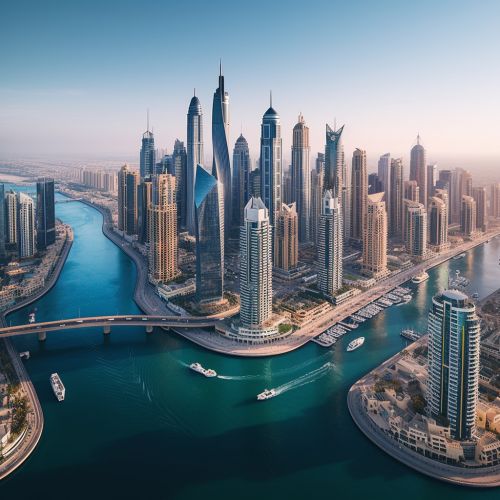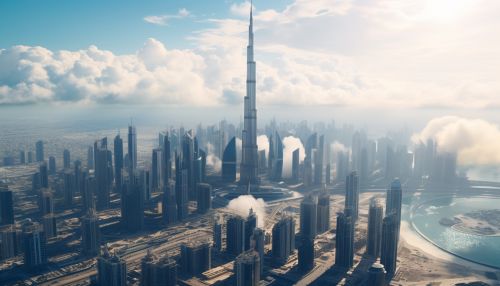Economy of Dubai
Overview
The Economy of Dubai is a diverse and rapidly growing structure, with a broad base in sectors such as trade, tourism, aviation, real estate, and financial services. The emirate's government is constantly working to diversify and lessen the economy's dependence on oil by focusing on service and tourism sectors. Dubai's economy has experienced significant changes due to the emirate's ambitious growth plans, known as the Dubai Strategic Plan 2025, which aims to make the emirate a hub for a variety of industries.


Economic History
In the early 20th century, Dubai's economy was primarily based on fishing and a declining pearl industry. However, the discovery of oil in the late 1960s led to a boom in the economy, transforming the emirate into a thriving global business hub. The first oil exports from Dubai took place in 1969, and since then, the emirate's economy has diversified and become less dependent on oil.
Economic Sectors
Trade
Dubai has historically been a trading hub, and this continues to be a major part of the economy. The emirate's strategic location between Europe, Africa, and Asia, its excellent infrastructure, and its liberal economic policies make it an ideal location for trade. The Dubai Ports World is one of the world's largest and busiest ports, handling millions of containers each year.
Tourism
Tourism is a key pillar of Dubai's economy, contributing significantly to its GDP. The emirate is known for its luxury hotels, world-class shopping, and modern architecture, including the Burj Khalifa, the world's tallest building. Dubai's tourism industry is supported by the government's significant investment in the sector, including the development of new tourist attractions and infrastructure.
Aviation
The aviation sector plays a crucial role in Dubai's economy. The emirate is home to Emirates Airline, one of the world's leading airlines, and Dubai International Airport, one of the busiest airports globally. The aviation sector contributes significantly to Dubai's GDP and is a major employer in the emirate.
Real Estate and Construction
The real estate and construction sectors are significant contributors to Dubai's economy. The emirate is known for its ambitious construction projects, including the Palm Jumeirah and the Burj Khalifa. The real estate market in Dubai is dynamic, with a range of properties available, from luxury villies to affordable apartments.
Financial Services
Dubai is a major global financial hub. The Dubai International Financial Centre (DIFC) is home to many international financial institutions and corporations. The emirate's robust regulatory framework, modern infrastructure, and strategic location make it an attractive destination for financial services firms.
Economic Policies and Initiatives
The government of Dubai has implemented various policies and initiatives to diversify the economy and promote growth. These include the Dubai Strategic Plan 2025, which aims to transform the emirate into a knowledge-based economy. The government has also implemented policies to attract foreign investment, such as the introduction of free zones, which offer 100% foreign ownership and zero taxes.
Challenges and Future Prospects
Despite its rapid growth and diversification, Dubai's economy faces several challenges, including fluctuating oil prices, regional instability, and global economic conditions. However, the emirate's strategic location, robust infrastructure, and liberal economic policies provide a strong foundation for future growth.
